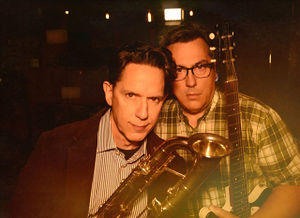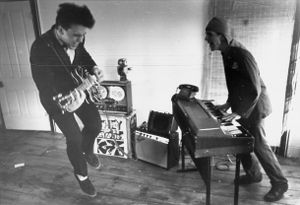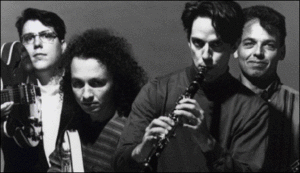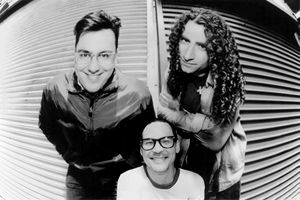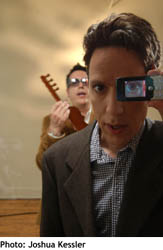They Might Be Giants
- This article is about the band, They Might Be Giants. For the...
...debut album, see They Might Be Giants (Album).
...song, see They Might Be Giants (Song).
...1971 George C. Scott film, see They Might Be Giants (Film).
...iOS and Android app, see They Might Be Giants (App).
They Might Be Giants (often abbreviated to "TMBG") is an American alternative music group from Brooklyn, NY. The group was founded by John Flansburgh and John Linnell, and has since expanded to include a backing band, currently composed of Dan Miller, Danny Weinkauf, and Marty Beller. Throughout their 43-year career, the band has racked up several charting albums and singles, as well as two Grammy awards (one for their song "Boss Of Me", and the other for their children's album Here Come The 123s). Additionally, their 1990 album Flood has been certified Platinum, while the DVD of Here Come The ABCs achieved Gold status. The band continues to record alternative albums, and have also branched out into the realm of children's music.
Contents
[hide]- 1 History
- 1.1 Then, the earlier years... (1959-81)
- 1.2 And no one's ever heard of our band... (1981-85)
- 1.3 Laugh hard, it's a long way to the bank... (1986-89)
- 1.4 A crowd gathered at the window... (1990-92)
- 1.5 Fighting for their place in rock and roll... (1993-99)
- 1.6 Hello, Hello... (1993-99)
- 1.7 You can change your shape and you can grow... (2000-05)
- 1.8 They've got plans for everyone... (2006-10)
- 1.9 Time is marching on... (2011-2014)
- 1.10 Begin again, begin again... (2015-2018)
- 1.11 I lost Thursday... (2019-present)
- 2 Discography
- 3 See also
- 4 External links
History[edit]
Then, the earlier years... (1959-81)[edit]
John Linnell was born on June 12, 1959 in New York and John Flansburgh was born May 6, 1960 in Lexington, Massachusetts. Lincoln has been collectively described as a culturally removed, upper-middle class, rural-suburban town in the heart of liberal America, both then and now.
When Linnell was eight years old his family moved to Lincoln, Massachusetts. Details regarding first encounters between Flansburgh and Linnell are sketchy. Both believe that they likely first met sometime in elementary school. One early encounter occurred in Lincoln's Hartwell Elementary school, when Linnell was in the hospital and his class (including Flansburgh, showing how small a town Lincoln was at the time) was asked to send get-well cards to the ailing Linnell. Flansburgh remembers the experience as being "bogus" since he didn't know Linnell, and Linnell remembers it as being surreal for the very same reason (he really didn't know most of the kids who sent the cards). Another account of an early encounter, as related by Linnell, is of Flansburgh approaching him with an odd play made up of 100 one or two line acts. Flansburgh was sincere, but Linnell remembers being put off a bit by this eager, loud fellow student. Yet another maintains Flansburgh first really approached Linnell after he admired a homemade comic that included a centerfold of the authors as Nazis. Linnell also once told a story of John Flansburgh repeatedly calling him up to talk about nothing, without Linnell really knowing who he was.
No matter the story, they became friends in high school. The two made and distributed small comic books, including one called "Dark Brown Funnies."[1] In his freshman year, Linnell joined the school newspaper, The Promethean; Flansburgh joined the following year. Both wrote for the paper, Linnell was a productive cartoonist (among his productions was "William F. Buckley and Donald Duck Blast Off For Jupiter"). By their senior year the two were co-editors. This newspaper was unlike any other, liked by those on the staff, lacking a sports section and disliked by the student body at large. Flansburgh and Linnell often credit the clique of friends that worked on the paper as having a lasting impact on their cultural sensibilities. Flansburgh: "I guess the first real rock concert I saw was The Mothers of Invention in Boston in the early 70s (at the Music Hall?) with John L."[2]
Flansburgh's earliest musical interest was in sound recording equipment. "I didn't have a guitar, I didn't have musical instruments. To me, the tape recorder was the instrument. And I was just fascinated with recording. My dad had a dictating machine, he brought it home from work. I just spent an hour saying 'hello, hello' and listening to it back."[3] His first tape recorder was an RCA transistor radio/three-inch reel-to-reel, which he bought when he was about nine years old.[4] At the age of 12 he saved money from a summer job to purchase a TEAC 3340 4-track tape recorder.[5] He and Linnell played around with the 4-track, recording a version of Yoko Ono's "Don't Worry, Kyoko (Mummy's Only Looking for Her Hand in the Snow)" with faux-Rod Serling voices. This may have been their first recording together. The pair also recorded covers of The Rolling Stones' "Under My Thumb" and Soupy Sales' "That Wasn't No Girl."[6] They once played a tape of their recordings over their school cafeteria's speakers, to the confusion of their peers.[7] At around this time they might have started a group with their mutual friend James McIntyre, and rehearsed in his basement.[8] In the summer of 1977, Flansburgh traveled to England in a student exchange program. There he witnessed the British punk rock scene first hand, and attended one of Elvis Costello's earliest London performances.
After high school, Flansburgh and Linnell split up for college. Linnell completed a year at the University of Massachusetts before taking off one year that stretched into many. He relocated to Rhode Island and joined a New Wave band called The Mundanes. They generated some popularity and decided to move to New York to further their career. John Flansburgh attended a few colleges; first George Washington University in Washington, D.C. and then Antioch College in Yellow Springs, Ohio. In 1981 he moved to New York to attend Pratt Institute, where he would eventually graduate with BFA in printmaking.
Flansburgh and Linnell both arranged for apartments in Brooklyn through a mutual friend, and because of a carpool to the city ended up moving into the same building on the same day in September 1981 (possibly September 1st).[9][10] Linnell reflected in a 2003 interview:[11]
Actually John and I moved together, because we were still in touch with each other and still friends. So, John was moving his stuff from Boston and he stopped and picked me up in Providence, along with, like, my two suitcases, and that was everything we had. And we moved to the same building in Brooklyn that a friend of ours had figured out - there were two apartments that were opening up for me and John to move into. And then promptly I stopped playing with [The Mundanes], like very soon after I got to New York.
And no one's ever heard of our band... (1981-85)[edit]
In September 1981, John Flansburgh and John Linnell moved in to the same apartment building, a run-down brownstone at 341 Third Street in Park Slope, Brooklyn.[12] The building was occupied by a group of people they knew from Lincoln.[13] It was one of twelve identical brownstones on that street, three of which had been torched by their owners for insurance money.[14] Flansburgh was living on the floor above Linnell.[15] By 1982 the pair had started sharing musical equipment and were recording on each others demos. Linnell: "[At that point] we basically resumed what we were doing before graduation."[16]
At around this time they formed an act with Dave Lindsay, a mutual friend who also lived in the building. This "oddball three-piece" featured Flansburgh on guitar, Linnell on keyboards, and Lindsay on upright bass. Linnell has credited Lindsay as the main reason they ever considered starting a band: "[Lindsay] said 'Let's make a band.' John and I would never have admitted that that was something we actually wanted to do, but suddenly it seemed groovy. We never performed, but we felt like a band because we practiced our three songs over and over."[17] The song "Cowtown" was written for this band. Flansburgh recalls that Linnell and Lindsay shared a passion for microtonal music, something that he "wasn't up for" yet.[18] The trio "rehearsed for like a month" before Lindsay departed.[19][20] Flansburgh and Linnell continued to collaborate as a duo, and they devised a plan to produce a flexi-disc single featuring "Cowtown" backed with "My Father's Son."[21][22]
Together the pair moved in to a duplex apartment at 213 DeKalb Avenue in Fort Greene, Brooklyn. They shared the apartment with another Pratt student, and they set up a full drum set in their shared space.[23] Flansburgh: "We did so much recording and rehearsed every night for an hour, no matter what."[24] "Space Suit" was one of the duo's first original songs, and was written by Flansburgh to apply complex chords he'd learned from his guitar teacher. It was initially titled "I'll Remember 3rd Street" in reference to their first apartment. The band wrote in the Then: The Earlier Years liner notes:
Although we had begun recording and performing while living in a building in Park Slope, it was our good fortune to find an unusually large and sonically isolated apartment together in Ft. Greene (above a realtor that closed at night and a barbecue restaurant that was often louder than us.) This setup afforded us the unlimited time and noise-making capability for They Might Be Giants to really take shape.
The duo's first show was in Central Park on July 18, 1982. Their performance was part of a picnic celebrating the third anniversary of the Nicaraguan Revolution. Not yet using the name "They Might Be Giants," the duo was simply introduced to the Spanish-speaking audience as "El Grupo De Rock And Roll." The show's setlist included "I'll Remember 3rd Street," "Cowtown," "Cabbagetown," "Alienation's For The Rich," "Birds Fly," and "Penguine." Flansburgh played electric guitar, Linnell played clarinet and a Farfisa organ. The band did have a name at this time, but they have not revealed what it was. The name might have been "Circle Gets the Square"[25] or "The Pencils."[26]
Flansburgh and Linnell were still intending to form a full band at this point, and they spent some time auditioning drummers and bass players. Flansburgh: "We looked for a drummer for a while--mostly in late '82/early '83 I think. We went to a few peoples rehearsal spots and had a few people come over. Some of our earliest tracks actually included drummers we were auditioning. NYC was a very hostile environment for figuring out how to find a drummer."[27] Having no success in hiring a rhythm section, the duo found inspiration in the musician Mick Milk, a friend of Flansburgh. Milk performed in clubs as a one-man act, accompanied only by his guitar and a prerecorded backing track.[28] Flansburgh: "We felt if he could do it as a one-man band, we can be a two-man band... it's flexible and extreme."[29]
The band played their second show on February 13, 1983, now under the name They Might Be Giants. The gig took place at Dr. B's, a small showcase club in SoHo, Manhattan. It was in the middle of a heavy snowstorm, and 23 friends attended. The band was accompanied by a prerecorded backing track for the first time. This format would come to define their live show for the next nine years. Each song's accompanying backing track was produced at home or at a studio, and was played while the band performed. In their earliest performances the band had Flansburgh's TEAC 4-track reel-to-reel tape recorder on stage with them. Flansburgh would start the tape on the machine at the beginning of the set, and it would run continuously until the end, leaving no breaks between the songs. Linnell, in Gigantic, describing the setup for their earliest shows:
We had a whole lot of conversations about how we were gonna do this and I think it started with one of us wanting to get a band and the other one wanting to do more high-tech duo thing and then we figured out a way to do something we both liked using just a reel-to-reel tape recorder playing straight through.
The name "They Might Be Giants" came from a ventriloquist friend, Raoul Rosenberg. Some time after their Central Park show the band wrote a list of potential names, but weren't satisfied with any of them — though "Dumptruck" was one that they liked and came close to using.[30] Rosenberg had assembled a long list of names for his own ventriloquism act. "They Might Be Giants," the title of a 1971 film, was one of these that he had decided not to use. The film itself had no personal significance to the band, but they liked the way it sounded. Flansburgh explained in 1993:[31]
The key ingredient to its interest to us was the fact that it was a full sentence. It wasn't so much that it had the word "giants" in it, or that it suggested that we had some larger future. In fact, we were kind of surprised that people thought that the "they" was referring to us. [...] We just thought it was a kind of outward-looking, paranoid name, and the fact that it was a full sentence seemed kind of interesting.
The band started playing live regularly in 1983, and they were drawing a following. Bill Krauss, a college friend of Flansburgh, saw the band at one of their early shows at Dr. B's. He soon started collaborating with the band — initially joining as their bass player, but quickly finding his role as their sound man and producer.[32] He convinced the band that the live show would have more flexibility if he manually operated the backing track tapes. Krauss' first show with the band was in 1983 at CBGB. At around this time, Linnell picked up the accordion. The first time he played it in public was when the duo busked on the Brooklyn Heights Promenade. They played a set that included some Ramones songs, "Cowtown," "Alienation's For The Rich," and Ellie Greenwich's "Maybe I Know." Greenwich's aunt happened to see them perform the song and gave them $20. They immediately stopped playing and bought lunch at Junior's.
In late 1983, Flansburgh and Linnell were evicted from their Fort Greene apartment and were forced to quickly find new places to live.[33][34] John Flansburgh moved to a new apartment in Bed-Stuy by himself, and the day he moved in, all of his belongings were stolen. Flansburgh: "I moved into this apartment for one day, and unfortunately some of the other occupants in the building were drug dealers, and they weren't too happy about me being in the place. So when I went off to work they set me up to be robbed, I basically lost all my worldly possessions."[35] Flansburgh lost everything he owned, including his guitar and most of his music equipment. "The one thing they did not take was my four-track tape recorder because it was too heavy. In fact, if they had taken it, we probably would have never been able to regroup."[36] That same week John Linnell, working as a bike messenger, broke his right wrist in a bicycle accident. Linnell: "I didn't maintain my bike very well — that was the thing that brought me down. I've never been clear on how this happened, but somehow the bike froze and I went over the handlebars with about forty pounds of stuff on my back and landed on my right hand. That ground the band to a halt for about four months while my wrist was healing."[37]
The band wanted to keep their momentum going despite being unable to perform. In November they started "Dial-A-Song," a telephone service that would pick up calls and play back a song in the place of an outgoing message.[38][39] It could be reached at (718) 387-6962. The first song featured on the service was "Toddler Hiway".[40] The service was initially named "Dial-A-Machine," and changed to Dial-A-Song in mid-1984. The Dial-A-Song number was initially advertised on posters and in the classified section of The Village Voice. The phone line was open to taking messages, and it was intended that people would leave feedback on the songs. The band stopped taking messages after a few years. Dial-A-Song has since become a staple and icon of the band. The project has been active, in various forms, for the most of the band's existence.
By the early 1980s, a thriving art scene was developing in Manhattan's East Village. Performance art spaces including The Pyramid Club and 8BC became the main venues for the band. Flansburgh: "We had been kicking around New York for a couple of years doing stuff, and then when the East Village exploded, we just happened to be in the right place at the right time."[41] By 1985, They Might Be Giants were performing weekly in clubs and performance spaces around New York. A small basement club named Darinka opened in April 1984, and the band first played there the following June. From 1985 to 1987, they performed at Darinka on a monthly basis and were considered the house band. There the band developed their distinctive live show, characterized by it's use of theatrics and props.
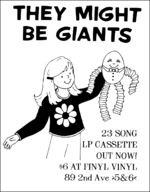
From 1983 through 1986, the band assembled several homemade demo tapes. The band's first official release was the Wiggle Diskette flexi-disc single in March 1985. 1000 copies were cut and distributed. It featured two tracks; "Everything Right Is Wrong" and "You'll Miss Me." Later that year, they released a full-length, self-titled demo tape. Its 23 tracks were recorded and produced at home and after-hours at the Public Access Synthesizer Studio in New York. The recordings were produced by Bill Krauss and engineered by Alex Noyes. The band sold the tapes by mail order, at concerts, and at the record store Finyl Vinyl. In June 1986, the demo tape was reviewed by Michael Small in People magazine, giving the band some of its first national exposure.
Laugh hard, it's a long way to the bank... (1986-89)[edit]
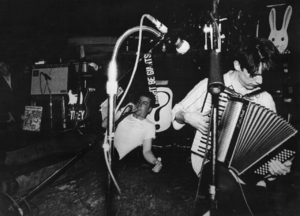
In 1986, aspiring director Adam Bernstein saw They Might Be Giants perform at Darinka. Bernstein was impressed, and he offered to direct a music video for the band. He later recalled: "I approached John Flansburgh backstage and said 'Look, I got fifteen hundred bucks. Do you need to do a video?' Initially they were distrustful, but eventually they came around to the idea that they were getting a video for free."[42] In July they created a music video for "Put Your Hand Inside The Puppet Head," the first song on the band's demo tape. They spent two days and $1500 shooting it. The video consisted mainly of Flansburgh and Linnell lip-synching and dancing in an empty lot on the Brooklyn waterfront. The clip received substantial play on music television, despite the band not having released a record. It was heavily played on local New York music video station U68 as well as Nickelodeon, and was later picked up by MTV.[43]
In the fall of 1986, the band signed a recording deal with Bar/None Records. Bar/None was a small Hoboken-based independent record label founded by Tom Prendergast in 1986. Glenn Morrow joined Bar/None as a business partner soon after it's formation, with the specific intention to sign They Might Be Giants. Morrow had worked with the band before, and was impressed by their demo tape.[44][45] John Linnell recalled in 1988: "[Morrow] heard the cassette and liked it, so he made the suggestion to clean up the tracks, cut a few songs, and he said he'd press it as a record."[46] John Flansburgh: "They said, 'We'll manufacture that tape for you and you can sell in record stores.' It wasn't like, 'We're gonna make you stars.' It was more like, 'Hey, want us to print up your record? We'll do that.' It was very low-key."[47] The band set about re-recording and remixing material from their demo tape at Dubway Studio in Manhattan.
The band released their debut album, They Might Be Giants, on November 4, 1986. The album garnered positive reviews and was a minor success. By January 1987, the album had sold out its initial pressing of 2,500 copies.[48] Flansburgh recalled: "When we had sold 10,000 copies six months [after the album's release], we had a big party for all our friends who had helped us so much along the way and it seemed like things might have run its course."[49] The band supported the album's release with their first tour, which they named the "Bring Me The Head Of Kenny Rogers World Tour."
In mid-1987, the song "Don't Let's Start" unexpectedly gained traction, when it started to receive significant airplay on college radio stations. It was quickly determined that the band should formally issue "Don't Let's Start" as a single. In November, they released the Don't Let's Start EP, the band's first extended play. They collaborated again with Adam Bernstein to create a music video for song. The black and white, jerky, sped-up video was shot in Flushing Meadows–Corona Park, the site of the 1964 World's Fair, with a budget of $5000. The video entered heavy rotation on MTV in January 1988,[50] becoming one of the first independent-label videos to air regularly on the station.[51] The album, which had been selling 1,000 copies a month, sold 50,0000 copies in January. By April, the total amount of sales reached 100,000.[52][53]

They Might Be Giants' second album, Lincoln, was released in September 1988. Containing eighteen songs ranging in style from blues to salsa, Lincoln sold well, spending nineteen weeks on "The Billboard 200" chart. One of the singles from the album, "Ana Ng," became the band's first charting single, peaking at #11 on Billboard Modern Rock Tracks. They Might Be Giants made music videos for three of the album's songs: "Ana Ng," "Purple Toupee," and "They'll Need A Crane."
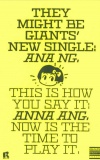
The video for "Ana Ng" was one of the band's most popular videos. The song's narrator laments over the fact that he and his soul mate, "Ana Ng," will never meet. Again, the melody is upbeat with profound, depressing lyrics. "Everything sticks like a broken record / Everything sticks until it goes away / And the truth is we don't know anything". Filmed at fireman training grounds in New York, the video has a serious, almost military air about it. The band and Adam Bernstein decided not to use lip-synch in the video — in its place is very stiff synchronized dancing.
Much of They Might Be Giants' subject matter during their early years was very dark and dismal. TMBG's manager, Jamie Kitman, summed up their complex lyrical style: "They're funny, but they're sad." Flansburgh has noted that their early songs were downers. "There's a pretty relentless thread in the text of our songs, especially in the first fifteen years of our songwriting that's pretty relentlessly, you know, kind of earth-shatteringly dour". When asked about the significance of his lyrics, Linnell says that they are what they are: "People get everything, and the things they think they don't get don't exist."
A crowd gathered at the window... (1990-92)[edit]
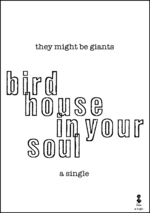
In 1989, the band signed with a major label, Elektra Records. The following year, Flood, their third and best-selling album of all time, was released. The album went gold in December of 1993. The record contains three of the songs for which They Might Be Giants are best known: "Birdhouse In Your Soul," "Particle Man," and their cover version of The Four Lads song "Istanbul (Not Constantinople)." After Flood, They Might Be Giants' popularity was at its peak. They were frequent guests on many television programs in the US and in the UK, including Top of the Pops, 120 Minutes, Late Night with David Letterman, and even appeared on The Tonight Show Starring Johnny Carson.
"Birdhouse in Your Soul" is the band's highest-charting single of all time in the US as well as in the UK. It reached #3 on the US Modern Rock Tracks Chart and #6 on the UK Singles Chart. The song is sung from the point of view of a nightlight. It has a beautiful melody and circular, slightly cryptic lyrics such as "I'm your only friend / I'm not your only friend / But I'm a little glowing friend / But really I'm not actually your friend / But I am." The song has an anthemic quality to it, and the music video reflects that, with extras wearing placards saying "Stop rock video," boldly marching in a kind of protest around John Flansburgh and John Linnell, who are on a platform in the middle of a large, ornate room.
The songs "Istanbul (Not Constantinople)" and "Particle Man" were made into animated music videos for Tiny Toon Adventures. For many fans, this was their first exposure to They Might Be Giants. John Flansburgh has said that it was strange to him that so many people became fans through the videos because he and John had absolutely nothing to do with their production. On Direct From Brooklyn, Linnell says, "It was the easiest video we ever did."
In 1992, They Might Be Giants released their fourth studio album, Apollo 18. The album, presumably because of its few spacey songs, drew the attention of NASA, who had declared 1992 International Space Year. They Might Be Giants were selected to be the "Musical Ambassadors" for this cause. The band did not know exactly what their role was supposed to be. John Linnell related his uncertainty in an interview with Joab Jackson: "We don't have a super clear idea of what it is we're supposed to be saying about it. We're supposed to be included on lists of events happening in connection with International Space Year. In other words, on a particular month they'll say in some town there's this lecture about space telescopes and then there's this They Might Be Giants concert. It does seem kind of weird—disconnected to us." When Flansburgh was asked about what being Musical Ambassadors meant, he replied, "It doesn't mean anything, actually. We're like the musical equivalent of Tang."
The album was, on a whole, the sign of a duo comfortably embracing the quirky, dark style and sound that had become their own. Rich with more complex instrumental sounds, the album shows the band employing more of an electronic sound than on previous records. One of the unique features of the album was the last twenty-one tracks, all short songs, collectively known as "Fingertips." Typically no more than fifteen or twenty seconds long, they were designed to utilize the shuffle mode on most CD players, being interspersed throughout the album (although they note that the suite's track list was in a definite and planned order). Three singles were chosen from the album—"I Palindrome I," "The Statue Got Me High," and "The Guitar (The Lion Sleeps Tonight)"—with music videos made for the latter two.
Fighting for their place in rock and roll... (1993-99)[edit]

Linnell and Flansburgh had been asked by Elektra around the release of Flood to expand to a full band and get backing musicians. They were wary of the idea. In the documentary Gigantic (A Tale of Two Johns), John Flansburgh describes the pressure:
I think our natural response was, you know, 'just leave us alone, because what do you know about how to be a success in rock?' Here we are, barely successful at all!
After touring Apollo 18 for a few months in early 1992, the band decided to switch the show up. Their first plan was to have Kurt Hoffman join them on tour and feature on a few songs. Eventually they decided to put together a full band and scrap the backing track completely. The first live band lineup was Kurt Hoffman (keyboards, horns), Tony Maimone (bass), and Jonathan Feinberg (drums). Finding bandmates was relatively easy, due to the fact that the band resided in New York City.[54] The full band made their live debut in June 1992. That year they embarked on the Don't Tread On The Cut-Up Snake World Tour, playing over fifty shows. The Gigantic documentary mentions some fans boycotting shows because of the new live band. Flansburgh has denied this, stating that there was "zero resistance from our live audience."[55] He further explained: "In the movie Gigantic, I think there's sort of a bunch of fake drama infused into this transition [into a full band]; this transition was not bad. It was an easy and generally celebrated transition. But in the edit of the movie, it sounds like there were people walking out on our show. I feel like it's kind of hypey."[56] Putting together the live band was initially just an experiment. Flansburgh explained in 2019:[57]
In our case, the label had exactly no say in how we went about putting anything like that together, and I don't think we even told them what we were planning until we had figured it out. [...] The truth is it was very much an experiment and it wasn't predetermined in our minds that it was going to work. But ultimately it freed us up in a lot of ways and focused up our own playing.
John Henry, the band's fifth studio album, was released in 1994. As their first album featuring a full band, the record is much more horn- and guitar-laden than previous records. Though John Henry spent only 4 weeks on the "Billboard 200", it reached, at its peak, #64, higher than any of their earlier records. The album's title references the "man vs. machine" legend of John Henry, referring to the band's recent switch to "man" (human drummer) from "machine" (drum machine). With twenty songs and nearly an hour's worth of music, John Henry is TMBG's longest studio record. The album determined the band's new, full sound while keeping all the lyrical and musical quirks for which TMBG had become known.
In 1996, the band released the album Factory Showroom. Though the album only had thirteen tracks, the individual songs were longer than on previous records. Factory Showroom was TMBG's second album with a full band, with the talents of Brian Doherty on the drums, Eric Schermerhorn on lead guitar, and Graham Maby on bass. The album spent two weeks on the Billboard 200, peaking at #89. Free from their contract, They Might Be Giants left Elektra Entertainment after the release of Factory Showroom and returned to Restless Records, whom they had attempted establishing connection with through the song "Become A Robot" a decade prior and who had connections to the band through their Bar/None releases in the 80s. In the first couple of years after TMBG left Elektra, Restless mainly released or reworked old songs from the band in new form, such as Then: The Earlier Years and Severe Tire Damage.
Severe Tire Damage, a live album, was released in 1998. Three of its tracks were studio tracks: "Doctor Worm," "Severe Tire Damage Theme," and "About Me." "Doctor Worm" was made into a music video, which was directed by John Flansburgh. The album contained seven hidden tracks, each one of them an improvised song in reference to the film series Planet of the Apes.
In 1999, They Might Be Giants partnered with eMusic, an online subscription music site, to release the full-length studio album Long Tall Weekend exclusively on their service. The band was the first major artist to release a full-length album exclusively online, and, as a result, They Might Be Giants were the most downloaded artist on the internet in 1999[58] and also in 2000.
Hello, Hello... (1993-99)[edit]
In between TMBG's Apollo 18 and John Henry albums, Flansburgh and Marjorie Galen began a record company that operated under a subscription model, the Hello CD Of The Month Club. Almost every month, starting in March 1993 and ending in December 1996, subscribers received a new EP of an independent/alternative band, released under the label. Many of the releases were by friends of the band, such as Frank Black, Brian Dewan, Kurt Hoffman, and Laura Cantrell.
But, the label also provided Flansburgh and Linnell the opportunity to release solo albums and projects. The first solo collaboration was between Flansburgh and Joshua Fried, called Hello The Band. Flansburgh claims the band formed simply because Fried wanted desperately to record the song "Hello Hello." Hello The Band released one eponymous EP via the club, which contained 5 songs, and nothing else.
In June of 1994, John Linnell released his first solo effort, an EP titled State Songs, through Flansburgh's Hello Recording Club. This CD only contained 5 tracks, but 11 more tracks were recorded and released in 1999 as part of a full album under the same name. Continuing with the "themed" album concept, Linnell also released House Of Mayors, a 15-minute EP consisting of ten songs, which were about former mayors of New York City. During these years, Linnell played several solo shows with his backing band The Statesmen, which included the TMBG-affiliated men Mark Donato on drums and Mark Lerner on bass, in addition to future Giant Dan Miller playing guitar.
The other side project to come out of the mid-to-late 90's was Flansburgh's group, Mono Puff. Led by John, the band was a collaboration between a handful of artists, including Hal Cragin, Steve Calhoon, Robin Goldwasser, Phil Hernandez, and others. From 1995 to 1996, the group released three EPs via the Hello Recording Club label. The label also released the band's first full-length album, Unsupervised (which was also released on Rykodisc). Two years later, Mono Puff's second and last full-length album, It's Fun To Steal, was released on the Bar/None label. Mono Puff has never officially been broken up, but is understood to be on indefinite hiatus, with the major obstacle being the geographical locations of the various band members.
You can change your shape and you can grow... (2000-05)[edit]

The dawn of a new century also saw a dawn of a new TMBG. Looking to expand into new areas, the band ventured into the realm of television, by creating 20+ tracks to be used as incidental music for the new television series Malcolm In The Middle. In addition, Flansburgh's theme for the show, "Boss Of Me" was an unexpected hit for the band, which yielded them their first Grammy.
In 2001, living up to their name, They Might Be Giants embarked upon a project of gigantic proportions in the form of TMBG Unlimited. Partnering with eMusic once more, TMBG dutifully released a set of 10 or so songs each month including new material, music from Dial-A-Song, battle of the bands songs, live performances, previously unreleased material, and demo versions of released songs. TMBG Unlimited was available for all eMusic subscribers at a cost of $10 per month. Subscribers to this service also got a sneak peak at the new Mink Car album throughout the run of Unlimited, having the chance to get the completed album a full two weeks before its street release.
TMBG Unlimited subscribers also got to hear several works-in-progress from TMBG's biggest philosophical departure in the band's history - No!. Their first children-oriented album in the band's history proved to be a success for the band by blending fun lyrics with more professional arrangements than is normal for most children's music. The album was received warmly by many critics, such as AllMusic who had this to say:
While They Might Be Giants' clever, playful melodies and lyrics make their music nearly ideal listening for kids anyway, their first children's album, No!, is one of their most dizzying and delightful in years.
The album debuted at #1 on the Billboard "Top Kid Audio Chart", and stayed on the chart for eleven weeks. The success of No! led the band to create more children's music. The band released the (only slightly) quieter book and CD set Bed, Bed, Bed in 2003.
After much begging, TMBG was finally convinced by AJ Schnack, an independent filmmaker, to allow him to produce a rock-umentary on the band's history. AJ followed the band during the tour for 2001's Mink Car and also interviewed musicians, music-industry people, and celebrities about "the guardians of alternative music." This footage was compiled into the film Gigantic (A Tale Of Two Johns) which was released to limited screenings in 2002, and a larger market in May of 2003.
Always believers in the power of freely letting curious ears listen, TMBG began "Free Tunes" services online as a so-called online version of Dial-A-Song from 1997 onwards, offering a greater quantity and depth as the years went on. TMBG Clock Radio, a Flash-based music streaming application which boasts "days of free music to enjoy," was released on tmbg.com in 2003. 2004 saw the opening of They Might Be Giants' online store, one of the first artist-owned internet stores. It also saw the release of the band's tenth studio album, The Spine. In stark contrast to No!, The Spine is much more "adult" than most of their previous adult records, with darker subject matter and grown-up lyrics. The band collaborated with Mike and Matt Chapman, creators of the popular Flash cartoon site Homestar Runner, to make a video for the song "Experimental Film." The video drew in many new fans, and the band and the Brothers Chaps filmed several videos, called Puppet Jams, with a puppet version of the character Homestar singing and playing along with the band.
In 2005, They Might Be Giants released their second children's album, Here Come The ABCs, on the Disney Sound label. The music was accompanied by videos and released on DVD as well as on CD. The DVD was a huge commercial success and quickly went gold, selling 50,000 copies. Amazon.com named the album the 13th best album of 2005 and the year's best children's album.
During their tour in 2004, the band decided to write and then play a song about each venue they played at. The band released the results of its Venue Songs project as a CD/DVD set in 2005. The DVD contains music videos for eleven of the songs and is narrated by the author John Hodgman, a former literary agent and previous collaborator with Flansburgh.
Coinciding with the increasingly frequent out-of-order condition of Dial-A-Song, at the end of 2005, the They Might Be Giants Podcast was born. Consisting of live, rare and unreleased tracks, the podcast quickly became one of iTunes' most downloaded podcasts within weeks of launch, reaching their top 10 list in December 2005. It continued on a sometimes-weekly, mostly-monthly basis, and averaged more than ten episodes per year. The podcast was seen by many fans as a modern replacement for TMBG's Dial-A-Song and Clock Radio services. Later, in 2008, John Linnell would confirm that Dial-A-Song had "mainly just died a technological death," as a result of the efforts put into feeding and maintaining the faulty, overloaded, and antiquated answering machine setup. The podcast ran for over 50 traditional audio episodes, with its last full one uploaded in May 2012, though its ending was never formally announced.
They've got plans for everyone... (2006-10)[edit]
They Might Be Giants' twelfth studio album, The Else, was released via multiple avenues in 2007. It was digitally pre-released in May on iTunes, and then fully released on physical CD in July with a bonus disc of remastered podcast songs. The album was later released in September on vinyl. Prior to The Else, their last album released as an LP was 1992's Apollo 18, the vinyl edition of which was limited to Europe. The Else also has the distinctions of being the first They Might Be Giants studio album in which every song is over two minutes in length, and the first not to have any accordion. Lacking a traditional single, four animated music videos of the album's songs were released online. As a whole, the album appears tightly produced, with many of the creative beats and samples due in part to the collaborating Dust Brothers. The band noted that many of the album's songs are more aggressive in tone than some of their other work; when asked about this, Linnell replied,
John called it our least cuddly record. Maybe that's a response to having done two records at once. We also recorded another kids album. Maybe we siphoned the friendlier music to the kids album, and the adult stuff is unalloyed adult material.
In what would become the second album in a series of three children's albums that the band would release on Disney Sound, TMBG released Here Come The 123s in 2008. To promote the release of the album, the band started a video podcast entitled the They Might Be Giants Friday Night Family Podcast in late 2007. The podcast consists of music videos from the album and Here Come the ABCs, introduced by puppet versions of Flansburgh and Linnell, voiced and puppeteered by Linnell and Flansburgh. The album was a strong seller in the children's music world, and helped They Might Be Giants to come in at #9 on Billboard's Year-End Top Kids Artists of 2008 (based on album sales). For the second time in their illustrious career, the band won a Grammy, this time in the "Best Musical Album For Children" category, on February 8, 2009.
The third entry in the Here Comes... series, Here Comes Science, debuted on iTunes on August 31, 2009. Following the band's most recent Grammy, sales of the CD/DVD set were even stronger than those of previous albums in the line, enough that Amazon.com moved their original release date back a week to handle its pre-orders. Here Comes Science was in turn nominated for a 2010 Grammy, also in the "Best Musical Album For Children" category. The band later released their second children's book, Kids Go!, following the success of Bed Bed Bed. It was released on November 3, 2009 through Simon & Schuster.
Time is marching on... (2011-2014)[edit]
The band kicked off 2011 with the announcement of a soon-to-be-released EP in February. There was little more news from the band until April heralded the beginning of the They Might Be Giants Instant Fan Club, a service offering limited-edition vinyl releases, exclusive MP3s, concert tickets, and more to 1,000 fans for an initial subscription fee. The day after the announcement, the 1,000 spots had all been occupied. A new club was opened in the following year, and the IFC is currently in its third iteration. Later in April, four tracks from the upcoming album were released digitally and through promotional discs marked as Join Us (Four Advance Tracks). Digital venues offered the option to pre-order the remainder of the digital album. April also saw the triumphant return of the They Might Be Giants Podcast, which had been inactive for over a year until the release of Podcast 41.
In March 2012, the band completed a full tour to promote their fifteenth studio album, Join Us, which was released July 19, 2011, and became the band's highest-charting album, peaking at 32 during its week on the Billboard 200 charts. Following its success, the Join Us sessions were further explored in the rarities compilation, Album Raises New And Troubling Questions. Join Us also continued the band's use of the vinyl format through its accompanying LP release. Other vinyl releases of the year included TMBG's Other Thing Brass Band, Four Covers From TMBG, two exclusive Instant Fan Club 7" EPs, and the first-ever pressing of Factory Showroom on the vinyl format by Asbestos Records.
The band released their sixteenth studio album, Nanobots, which contains twenty-five songs running a total of forty-five minutes, on March 5, 2013. The album was released through Idlewild. In support of the album, the band embarked on a worldwide tour, including their first shows in Australia, New Zealand, and mainland Europe in over a decade. Following the tour, the band released the compilation Idlewild in 2014, showcasing the studio versions of the material that had been played live over the previous decade or so.
Begin again, begin again... (2015-2018)[edit]
2015 started out with the resurrection of Dial-A-Song after a nine-year hiatus along with with a new phone number alongside their Dial-A-Song Direct service, promising a new song every Tuesday for the entire year. A new tour started out on April 16 in Pittsburgh.
Three albums were compiled from the 52 new Dial-A-Song tracks in 2015. TMBG's seventeenth studio album, Glean, was released on April 21st. A second album, Why?, was released in November. Aimed at children, it was ostensibly a follow-up to No!. A third album, Phone Power, was released in March 2016 and compiled most of the rest of the Dial-A-Song tracks.
The band's 20th album I Like Fun was released in January 2018, supported by another tour across the United States and Europe through 2018, along with the band's first tour of Canada. Curt Ramm joined the live band as a sixth member throughout 2018, primarily playing trumpet (and dueling trumpet and trombone on "Istanbul (Not Constantinople)").
They Might Be Giants also brought back their weekly Dial-A-Song service in 2018, featuring songs from I Like Fun, as well as The Escape Team (a comic collaboration with David Cowles and accompanying album), and songs that would end up on the album My Murdered Remains in December.
I lost Thursday... (2019-present)[edit]
They Might Be Giants began 2019 with a tour of Australia and their first appearance on JoCo Cruise, as well as two shows in the summer opening for Squeeze; the first time in many years TMBG chose to be an opening band. In July, the band began a fundraiser for RAICES that raised over $200,000 through sales of a new They Might Be Giants T-shirt. Later in the year, TMBG began writing and recording their next album.
In 2020, the band geared up to promote the thirtieth anniversary of Flood with a whirlwind tour that quickly sold out. However, as with the majority of the music industry in 2020, the COVID-19 pandemic led to the postponement of almost the entire tour. As quarantine measures continued on, the band released a new song, "I Lost Thursday," and wrote and recorded a song called "Who Are The Electors?" for a CNN television special. They also offered various albums and singles at a discount, including a new compilation called Modern, with proceeds going to help their out-of-work road crew. John Flansburgh also began hosting a weekly radio program on Jeffersonville, NY's WJFF station called Low Stakes.
The Instant Fan Club continued in advance of TMBG's next album, BOOK, announcing its 2021 release along with an EP called The Pamphlet and solo releases from both John Linnell and Mono Puff. John Linnell's Roman Songs, sung entirely in Latin, was released on July 2nd and accompanied by a music video for each of its four songs. BOOK was released on November 12th, 2021.
Discography[edit]
- See the main Discography for a complete list of albums, compilations, EPs, singles, and video releases by They Might Be Giants
Over the course of their career, They Might Be Giants has released 23 studio albums, 8 live albums, 6 full collections—and various truncated versions of these—in addition to the TMBG Unlimited series, more than 40 EPs, singles, and demo tapes, and 10 video releases. They have appeared as guest artists on a number of albums, and on a number of various artist compilations. John Linnell and John Flansburgh have also individually accumulated a number of solo releases.
They Might Be Giants' studio albums are listed below:
- They Might Be Giants (1986)
- Lincoln (1988)
- Flood (1990)
- Apollo 18 (1992)
- John Henry (1994)
- Factory Showroom (1996)
- Long Tall Weekend (1999)
- Mink Car (2001)
- No! (2002)
- The Spine (2004)
- Here Come The ABCs (2005)
- The Else (2007)
- Here Come The 123s (2008)
- Here Comes Science (2009)
- Join Us (2011)
- Nanobots (2013)
- Glean (2015)
- Why? (2015)
- Phone Power (2016)
- I Like Fun (2018)
- My Murdered Remains (2018)
- The Escape Team (2018)
- BOOK (2021)
